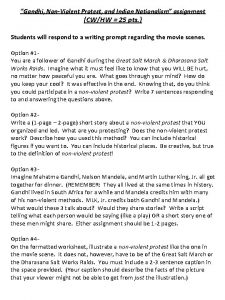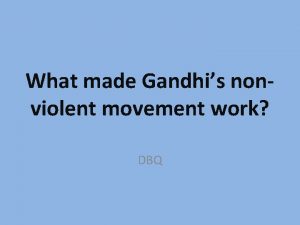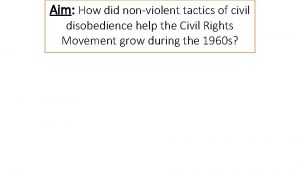Aim Summarize Gandhis Nonviolent Tactics Gandhis Tactics of





- Slides: 5

Aim: Summarize Gandhi’s Nonviolent Tactics

Gandhi’s Tactics of Nonviolence Amritsar set the stage for Mohandas K. Gandhi n Emerged as leader of independence movement n Teachings blended Hinduism, Jainism, Buddhism, Islam, & Christianity n Millions began calling him Mahatma meaning “great soul” n Gandhi urged the Indian National Congress to follow a policy of noncooperation with British govnt n 1920: Congress endorsed civil disobedience n Deliberate & public refusal to obey an unjust law & nonviolence as the means to achieve n

Boycotts Gandhi called on Indians to refuse to buy British goods, attend government schools, pay British taxes or vote in elections n Staged a successful boycott of British cloth n Urged all Indians to weave their own cloth n n Result of the boycott: Sale of British cloth in India dropped sharply n

Salt March 1930: Gandhi organized a demonstration to defy the hated Salt Acts n British laws stating Indians could buy salt from no other source but the government n Had to pay tax on salt n Gandhi and followers began to make their own salt by collecting seawater & letting it evaporate n Called the Salt March n People continued to march peacefully, refusing to defend themselves against their attackers n

Britain Grants Limited Self-Rule Gandhi & his followers gradually reaped the rewards of their civil disobedience n 1935, the British Parliament passed the Government of India Act n Provided local self-government and limited democratic elections, but not total independence n









